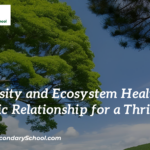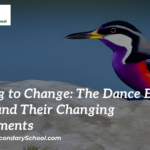Humans and Ecosystems
Throughout history, humans have been intricately linked to the ecosystems that surround us. Our actions, whether intentional or inadvertent, shape the landscapes, diversity of species, and overall health of the planet’s ecosystems. The interplay between humans and ecosystems is a multifaceted relationship that holds the key to our survival and the preservation of Earth’s natural beauty.
From Foragers to Stewards: The Evolution of Human-Ecosystem Interaction
Our species, Homo sapiens, emerged as foragers who lived in close harmony with nature, relying on ecosystems to provide food, shelter, and resources for survival. As societies evolved, so did our relationship with ecosystems. The development of agriculture allowed us to cultivate and manipulate the land, leading to the birth of civilizations.
However, the Industrial Revolution marked a significant turning point. Rapid technological advancements brought increased resource consumption and environmental alteration on an unprecedented scale. The expansion of urban areas, industrialization, and modern agriculture exerted pressure on ecosystems, often resulting in habitat loss, pollution, and the overexploitation of natural resources.
Ecosystem Services: The Lifeline for Humanity
Ecosystems offer a range of services that are essential for human well-being. These “ecosystem services” encompass everything from the provision of food, clean water, and raw materials to the regulation of climate, disease control, and recreational opportunities. These services are not only vital for our quality of life but also underpin economic systems.
For instance, wetlands act as natural filters that purify water, forests act as carbon sinks that mitigate climate change, and coral reefs provide coastal protection from storms. Recognizing and valuing these services is crucial for ensuring the sustainable management of ecosystems.
The Paradox of Progress: Balancing Development and Conservation
While human activities have undoubtedly contributed to advancements in technology, medicine, and quality of life, they have also led to negative impacts on ecosystems. Deforestation, pollution, habitat destruction, and the introduction of invasive species have disrupted delicate ecological balances, causing species extinctions and threatening biodiversity.
The challenge lies in finding the equilibrium between development and conservation. Sustainable development acknowledges that economic progress should not come at the cost of irreversible ecological damage. Striking this balance involves making informed decisions that consider both short-term gains and long-term consequences.
Towards a Harmonious Coexistence: Conservation and Restoration
Efforts to mend the strained relationship between humans and ecosystems are gaining momentum. Conservation initiatives focus on preserving critical habitats, protecting endangered species, and raising awareness about the importance of biodiversity. Conservation areas and protected parks serve as refuges for wildlife and as outdoor classrooms for environmental education.
Ecological restoration is another critical facet of our relationship with ecosystems. By rehabilitating degraded lands, reintroducing native species, and restoring natural processes, we can rejuvenate ecosystems and enable them to thrive once again. Restoration projects offer hope for the recovery of ecosystems that have been scarred by human activity.
The Call to Action: Individual and Collective Responsibility
The future of human-ecosystem interactions lies in the hands of every individual, community, government, and corporation. Adopting sustainable practices in our daily lives, advocating for environmental policies, supporting conservation organizations, and participating in restoration projects are all steps we can take to positively influence the health of ecosystems.
Global agreements such as the Paris Agreement and the Convention on Biological Diversity emphasize the urgency of addressing climate change and biodiversity loss. These agreements highlight the importance of international collaboration to tackle the shared challenges facing humanity and the ecosystems that sustain us.
Conclusion: A Shared Destiny
The intricate relationship between humans and ecosystems underscores the reality that we are not separate from nature; we are an integral part of it. Our choices and actions reverberate throughout the natural world, shaping the Earth’s future and the legacy we leave behind. By embracing our role as responsible stewards of the planet, we have the power to shape a harmonious coexistence between humans and ecosystems—one that allows both to thrive in a sustainable and interconnected manner.





